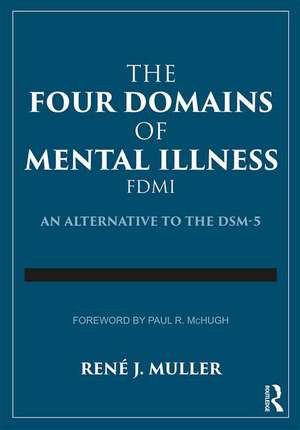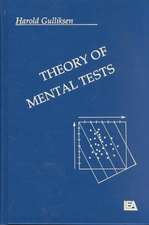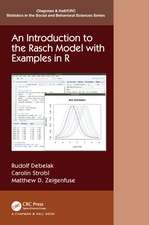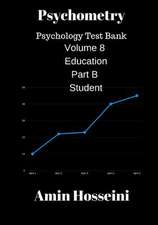The Four Domains of Mental Illness: An Alternative to the DSM-5
Autor Rene J. Mulleren Limba Engleză Paperback – 18 dec 2017
| Toate formatele și edițiile | Preț | Express |
|---|---|---|
| Paperback (1) | 319.80 lei 6-8 săpt. | |
| Taylor & Francis – 18 dec 2017 | 319.80 lei 6-8 săpt. | |
| Hardback (1) | 820.65 lei 6-8 săpt. | |
| Taylor & Francis – 26 dec 2017 | 820.65 lei 6-8 săpt. |
Preț: 319.80 lei
Preț vechi: 366.57 lei
-13% Nou
61.20€ • 63.53$ • 51.03£
Carte tipărită la comandă
Livrare economică 22 martie-05 aprilie
Specificații
ISBN-10: 1138308145
Pagini: 380
Ilustrații: 1 Line drawings, black and white; 2 Halftones, black and white; 1 Tables, black and white; 1 Illustrations, black and white
Dimensiuni: 178 x 254 x 28 mm
Greutate: 0.68 kg
Ediția:1
Editura: Taylor & Francis
Colecția Routledge
Locul publicării:Oxford, United Kingdom
Public țintă
Professional and Professional Practice & DevelopmentCuprins
Notă biografică
Recenzii
Peter Zachar, PhD, professor of psychology, Auburn University Montgomery
This a fascinating discussion of an extremely timely topic in mental health. For over 50 years the standard diagnostic reference has been the DSM (authored by the American Psychiatric Association), but criticism of this manual has been steadily growing with a sharp crescendo upon the publication of DSM 5 a couple of years ago. The negative reaction was widespread from professionals, news media, and academics, and the Director of NIMH responded by announcing that the DSM would no longer be used for psychiatric research due to its lack of validity.... My overall reaction to the book is positive… Since I am in agreement with much of the criticism of DSM, I find Dr. Muller’s Four Domain approach a welcome alternative.—Robert L. Taylor, MD, psychiatrist, Austin, TX
In general, I was terribly impressed by his erudition, and by his ability to take trenchant examples from belles lettres, from the movies, and from his neighbors! Dr. Muller exemplifies something that has become quite rare in medicine: a clinical scientist with deep humanistic learning. This makes much of the book a joy to read, even if, I as a reader often had to suspend disbelief—Edward Shorter, professor of psychiatry, University of Toronto
Descriere
The Four Domains of Mental Illness presents an authentic and valid alternative to the DSM-5, which author René J. Muller argues has resulted in many patients being incorrectly diagnosed and wrongly medicated. Dr. Muller points out where the DSM-5 is mistaken and offers a guide to diagnosis based on the psychobiology of psychiatrist Adolf Meyer and the insights of existential philosophy and psychiatry. His model identifies the phenomena of the mental illnesses that clinicians most often see, which are characterized by identifying their structure, or partial structure. Using the FDMI approach, clinicians can grasp how each mental illness is an aberration of Martin Heidegger’s being-in-the-world.













